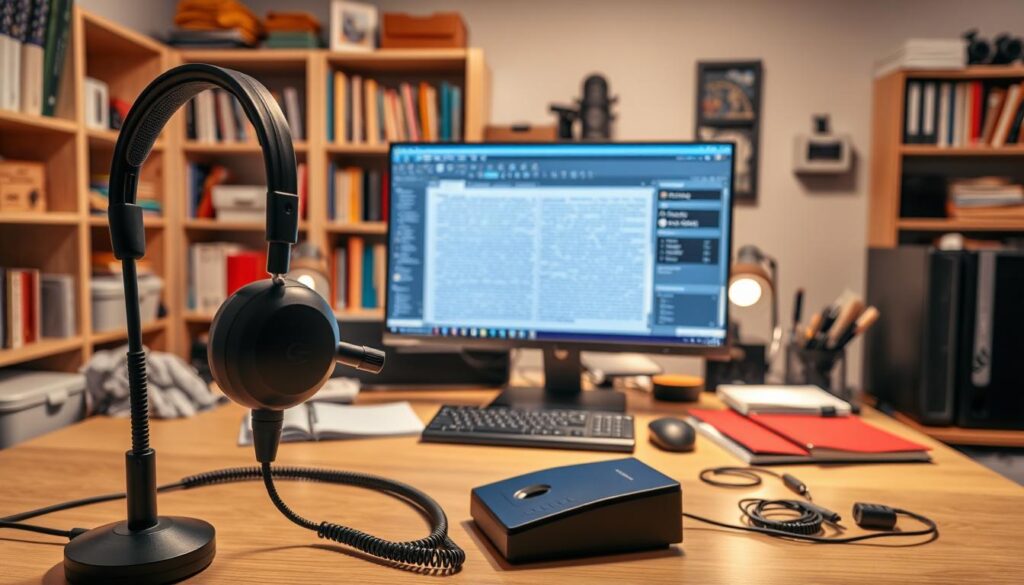Physical Address
304 North Cardinal St.
Dorchester Center, MA 02124
Physical Address
304 North Cardinal St.
Dorchester Center, MA 02124

The digital workforce continues to evolve, creating new ways to earn income without stepping outside your door. Platforms like Rev and Amberscript lead this shift, connecting skilled professionals with projects that match their expertise. This model eliminates rigid schedules and commutes, letting you design a workflow that fits your life.
Demand for accurate audio-to-text services has surged across industries like healthcare, media, and law. Companies now prioritize reliable specialists who combine sharp listening skills with fast typing speeds. While speech recognition tools assist, human oversight ensures precision in complex terminology and nuanced conversations.
What makes this career path appealing? Minimal startup costs. A computer, stable internet, and quality headphones are often the only requirements. Many professionals transition from fields like administration or customer service, leveraging their attention to detail in fresh, dynamic ways.
Beyond practicality, the work itself offers variety. You might transcribe a CEO’s keynote speech one day and document medical research the next. This diversity keeps tasks engaging while building transferable skills. Plus, the freedom to choose projects aligns with personal interests or expertise.
The shift toward virtual collaboration has created unprecedented opportunities for detail-oriented individuals. Converting spoken words into precise written records demands sharp focus and technical proficiency. Many platforms connect skilled freelancers with clients needing accurate documentation across industries like healthcare, media, and legal sectors.
Remote roles in this field attract diverse talent, including parents managing households and students balancing studies. Companies such as Ditto Transcripts prioritize candidates who combine quick typing speeds with meticulous proofreading abilities. Their screening process identifies professionals committed to delivering error-free results under tight deadlines.
Daily tasks vary widely—one project might involve documenting corporate strategy sessions, while another could detail scientific research interviews. This constant exposure to new subjects keeps the work intellectually stimulating. Specialized training programs help workers master industry-specific terminology, enhancing their value to clients.
Quality-focused services implement strict review systems to maintain standards. Regular feedback loops ensure continuous improvement, allowing dedicated individuals to advance into supervisory or editing roles. Online communities also foster knowledge-sharing among peers facing similar challenges.
With minimal equipment requirements, this career path offers flexibility without sacrificing professional development. As demand grows for reliable documentation, home-based specialists find their skills increasingly sought after in our information-driven world.
Entering the field of audio-to-text services demands awareness of platform specifics. Top providers like Amberscript display project details upfront—including file types, deadlines, and payment terms. This transparency lets you assess if assignments align with your schedule before claiming them.
Freelance platforms empower you to filter opportunities by complexity and subject matter. Some focus on general content, while others require expertise in legal or medical terminology. Beginners often start with simpler recordings to build speed before tackling specialized material.
Three elements separate successful professionals from casual participants:
Platform guidelines serve as your roadmap, detailing style preferences and accuracy expectations. Many services offer training modules to sharpen skills like speaker identification and noise filtering. Regular practice with diverse recordings helps you adapt faster to new project requirements.
Time management becomes crucial when handling multiple deadlines. Seasoned workers use productivity apps to track progress and maintain consistent output. Remember: Building a strong reputation through reliable work often leads to higher-paying opportunities over time.
Modern professionals increasingly prioritize control over their daily routines. Remote documentation roles excel here, letting workers set their hours around family needs or personal preferences. One Rev specialist shared:
“I attend school events and family trips now—things I missed in my old 9-to-5 job.”
This career path shines for parents and caregivers. No rigid timetables mean managing childcare or appointments without workplace penalties. Workers reclaim hours previously lost to commutes—time better spent on hobbies or side projects.
Key advantages include:
Digital nomads particularly thrive in this setup. They maintain income streams while exploring new locations—provided they have reliable internet. Seasonal workers also benefit, boosting earnings during quieter months without long-term commitments.
Studies show schedule autonomy reduces burnout risks. Professionals report better mental health when controlling their work pace. This model proves that career success and personal fulfillment aren’t mutually exclusive goals.
Your workstation’s backbone lies in reliable hardware and intuitive software. Choosing the right tools transforms chaotic workflows into smooth processes, letting you focus on accuracy rather than technical hiccups.

A capable computer with 8GB RAM handles multiple tasks effortlessly—essential when juggling audio playback, research tabs, and documentation software. Experts like Ditto Transcripts emphasize internet speeds above 10 Mbps to prevent upload delays during crunch times. Quality headphones with noise cancellation also prove invaluable for deciphering muffled recordings.
Express Scribe leads the pack with features like variable playback speeds and foot pedal compatibility. Web platforms perform best on Chrome or Safari—their frequent updates ensure compatibility with cloud-based systems. Look for programs offering automatic saves and timestamp shortcuts to protect against data loss.
Three elements define an optimized setup:
Investing in proper tools pays dividends through faster turnaround times and fewer errors. As you master these resources, you’ll unlock access to complex projects that reward technical preparedness.
Mastering documentation work requires balancing two core abilities: meticulous attention to detail and swift execution. Leading services like Ditto Transcripts enforce strict standards, requiring 95% accuracy in initiation tests that assess grammar, spelling, and formatting competence. This dual focus separates casual participants from sought-after specialists.
Error-free results begin with active listening techniques. Professionals replay challenging audio segments and cross-reference unfamiliar terms. One specialist notes: “I triple-check medical abbreviations—a single mistake could alter treatment plans.” Text expanders and style guides help maintain consistency across projects.
Effective practice strategies include:
Speed develops through structured sessions rather than rushed work. Many use timers to track progress, gradually reducing time per audio minute. Foot pedals and hotkeys streamline repetitive actions, preserving energy for complex tasks.
Key efficiency boosters:
Platforms often provide training modules to refine these skills simultaneously. Regular mock tests help gauge readiness for real assignments. As capabilities grow, workers unlock premium projects requiring both speed and flawless execution.
Taking your first steps in audio documentation requires strategic planning. Reputable companies like Ditto Transcripts prioritize thorough vetting to match skilled workers with suitable projects. This ensures both quality results and professional growth opportunities.
Begin by completing detailed online forms that assess your technical capabilities and experience. Ditto Transcripts, for example, requires an employment form and background checks for U.S. applicants. Qualified candidates receive direct communication from their team, streamlining the application phase.
Three elements streamline your launch:
Your test assignment demonstrates critical abilities. Focus on capturing speaker nuances while maintaining perfect formatting. One hiring manager notes: “Top applicants treat samples like paid work—it shows dedication.” Use style guides to align with company preferences before submission.
New specialists should expect:
Approval timelines vary, but persistence pays off. Many find the preparation phase invaluable for building sustainable workflows. As you start working, these foundations support long-term success in dynamic documentation roles.
Delivering error-free results requires more than sharp ears and fast fingers. Rigorous evaluation systems ensure every document meets client expectations. Leading platforms like Amberscript use multi-step checks to maintain standards while helping specialists grow their skills.
Your first hurdle? The skills assessment. These evaluations measure grammar mastery, formatting precision, and ability to follow style guides. One hiring manager explains: “We simulate real projects to see how candidates handle tricky accents or technical terms.”
Prepare by practicing with sample recordings matching your target industry. Time yourself to build speed without sacrificing accuracy. Many platforms provide practice materials through email after initial sign-up.
Quality controllers review every submission, flagging errors from misplaced commas to inconsistent speaker labels. Amberscript’s team, for instance, returns files needing corrections with detailed notes. This system turns mistakes into learning opportunities rather than penalties.
Successful specialists:
View revisions as skill-building exercises. A veteran shares: “Early feedback helped me spot patterns in my work. Now I catch errors before hitting ‘submit.'” This growth mindset transforms quality control from a hurdle into a career accelerator.
Professionals in documentation fields discover exciting career paths through niche expertise. Specialized roles demand unique knowledge while offering higher earning potential and intellectual challenges. Companies like Ditto Transcripts match skilled workers with projects requiring specific terminology mastery across multiple sectors.
Healthcare documentation stands out as a premium service. Workers must understand complex terms like “myocardial infarction” while maintaining patient confidentiality. Legal projects involve courtroom recordings where every comma matters—judges often reference these texts during appeals.
Corporate clients need precise meeting summaries for investor reports. One specialist shared: “I learned Fortune 500 jargon faster by studying their annual filings.” These roles reward those who enjoy continuous learning about different fields.
Multilingual professionals unlock extra opportunities through translation work. Converting English medical reports into Spanish helps clinics serve broader communities. Academic researchers also need bilingual support when publishing international studies.
Three growing areas include:
Specialization creates career durability. As industries evolve, experts who update their knowledge remain valuable. Whether focusing on financial earnings calls or pharmaceutical trials, tailored skills make professionals indispensable to clients.
Earning potential in remote documentation roles reflects both skill and specialization. Payment models differ across industries, with technical fields offering premium rates for expertise. Companies like Ditto Transcripts structure payments around project complexity and turnaround speed.
Legal and business projects often pay $0.80-$1.10 per audio minute. Medical specialists earn $0.07-$0.10 per line due to precise terminology requirements. Urgent court hearings can reach $5.00/minute during peak demand. Most platforms process payments twice monthly through direct deposit or PayPal, with notifications sent via email.
Consistent accuracy unlocks financial rewards beyond base rates. Top performers receive bonuses for beating deadlines or handling large volumes. One worker reported earning an extra $23/hour through weekend rush assignments.
Independent contractors must track taxes quarterly since platforms don’t withhold payments. Many use accounting apps to manage deductions for equipment and workspace costs. This financial awareness helps maximize take-home money while staying compliant.